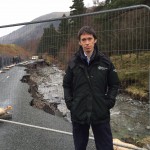RORY URGES FOOD AND DRINK BUSINESSES TO APPLY FOR SHARE OF £50K FUNDING
Rory Stewart MP is urging small food and drink businesses in Penrith and The Border to apply for the chance to win a share of £50,000 funding in the first competition aimed at pushing the boundaries in food business innovation to kick-start the next generation of food production.
The scheme has been launched by Defra, through its Food Innovation Network (FIN), which connects food and drink producers with world-class facilities such as test-kitchens, laboratories and the expertise to help them create new and innovative products and production methods. The grant funding will be distributed in the form of ‘Innovation Vouchers’ which can then be used to support innovative new ideas and business opportunities.
Global demand for food is projected to grow 60% by 2050 – the Government is committed to making sure Britain, with its scientific know-how and flair for innovation and quality, is in a superb position to take advantage of this.
Micro, small and medium sized food and drink businesses will be able to compete for one of 10 £5,000 FIN vouchers – with matched funding from industry – by pitching their innovative projects to a ‘dragons den’ panel of industry and technical experts.
The winners will be those who demonstrate their ideas are novel, achievable and support business growth. The money will allow food producers to invest in a wide range of innovative projects, such as reducing the use of water in growing vegetables, and creating new business opportunities.
Food Minister George Eustice said: “Our thriving food and drink industry needs to be innovative in order to be resilient and globally competitive. Some of our most innovative food businesses are smaller companies and each has unique challenges, from prolonging the shelf life of their products to developing new sources of protein. This new fund is aimed at helping support small businesses with a bright idea to develop their concepts in partnership with researchers or academic institutions.”
The competition, run on behalf of Defra by the Knowledge Transfer Network (KTN), will support projects of three to six months.
Applicants will need to submit an initial two-minute video pitch and a short description setting out their innovative business opportunity.
All ideas will need to demonstrate the need for research and development, innovation in the proposed solution, path to commercial application(s), nature of market opportunity and value for money.
Rory Stewart said: “I am very proud that we have a wealth of small businesses in Penrith and The Border who have been incredibly successful at producing high quality food and drink. Many of the people behind these businesses still have some great ideas, and a lot of ambition, and this new scheme could provide a fantastic opportunity to realise some more of that potential. I urge every eligible small food and drink business in the constituency to apply.”
Further details on how to apply can be found at www.foodinnovationnetwork.co.uk.





